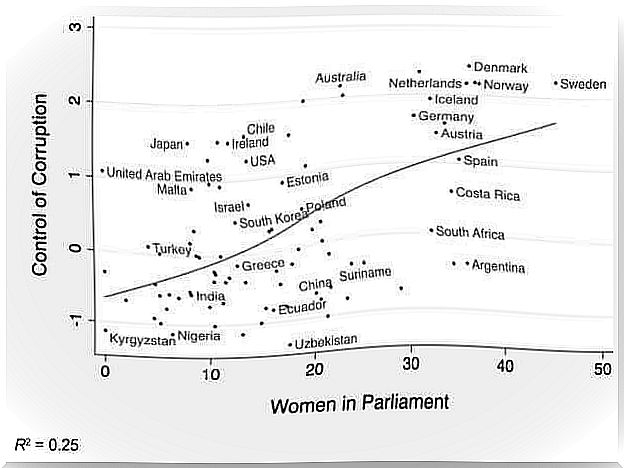Does Corruption Have A Gender?

Is there less corruption when women participate in politics? Does corruption have a gender? The study by Stensöta, Wängnerud and Svensson (2015) tries to answer these questions. He identified a relationship between greater numbers of women in parliament and greater control over corruption.
Are women less corrupt than men? The simple answer is yes, but the relationship between gender and corruption has many nuances.
First: why are women less corrupt? Are they less selfish? Do they have more self-control? Or just don’t have the same opportunities and aren’t invited to the club where the cake is shared?
This last question appears to have been answered in the recent study published in the Journal of Economic Behavior & Organization . Authors Chandan Jha of Le Moyne College and Sudipta Sarangi of Virginia Tech have shown that the relationship between gender and corruption is not due to gender differences in social status.
These authors suggest that corruption rates are unlikely to increase when women reach high social status.
In addition, this study also revealed another important finding; women’s presence in local governments was negatively related to bribery in an analysis of 17 European countries.
What is the relationship between gender and corruption?
Why is it important to have women in positions of power? While information on gender and corruption can be ambiguous, the overall benefits of gender diversity are not.
In the private sector, higher rates of return, lower chances of bankruptcy and other similar indicators of positive performance are observed.
In the public sector, evidence indicates that the presence of women in elected positions improves the allocation of public resources. On the other hand, it increases the likelihood that the interests of women and children will be represented among legislative priorities.

The political implications of the study point to the need to promote gender equality in general and to promote the presence of women in politics in particular. Previous research has established that a greater presence of women in government is associated with better outcomes in education and health.
So does corruption have a gender?
In countries where corruption is the social norm, women who tend to follow social norms more than men can act almost as corruptly as they do, or at the very least, it may be that women who rise to political decision-making positions do not feel the need to introduce codes of good behavior or fight corruption.
In fact, the relationship between women in positions of political responsibility and corruption disappears in authoritarian countries, as shown by Esarey and Chirillo (2013).
A Congolese parliamentarian explained bluntly: “In Congo, to survive, we all need to be a little corrupt. This is the system here.”
However, in countries where “good governance” is the social norm, increasing women’s political representation encourages them to support legislative measures that follow that social norm.
This explains why, in contexts like Europe, where there is obviously corruption, but it is not a social norm in the sense that everyone will accept corrupt behavior, it is important to encourage women’s political participation to combat this problem.










